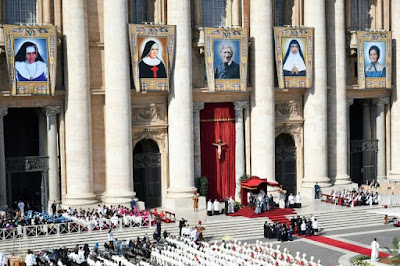 |
| Giant portraits of the new saints were hung from Saint Peter's Basilica for the canonisation ceremony which attracted tens of thousands of pilgrims (AFP Photo/Alberto PIZZOLI) |
Giant portraits of the new saints were hung from Saint Peter's Basilica for the canonisation ceremony which attracted tens of thousands of pilgrims (AFP Photo/Alberto PIZZOLI)
Vatican
City (AFP) - Pope Francis created five new saints on Sunday, including
Britain's Cardinal John Henry Newman -- one of the Catholic Church's most
renowned converts -- and a nun dubbed the "Mother Teresa of Brazil".
Heads of
state from across the world attended the canonisation ceremony, which also
raised a Swiss laywoman plus two other nuns -- an Indian and an Italian -- to
the highest position within the Church.
"Today
we give thanks to the Lord for our new Saints," the pope told the faithful
on Saint Peter's Square.
"They
walked by faith and now we invoke their intercession."
Prince
Charles, future head of the Church of England, led the British delegation
honouring Newman, a 19th-century Anglican theologian who went on to become one
of the Catholic Church's leading thinkers.
Francis
quoted Newman describing "the holiness of ordinary life" in which,
"the Christian is cheerful, easy, kind, gentle, courteous, candid,
unassuming; has no pretence... with so little that is unusual... that he may
easily be taken at first sight for an ordinary man."
Born in
1801, Newman attempted to "renew" the Anglican Church, before
becoming convinced that Catholicism was the only true faith and converting aged
44, rising through the hierarchy to become a cardinal.
Giant
portraits of the new saints were hung from Saint Peter's Basilica for the
ceremony which attracted tens of thousands of pilgrims.
'Miracles'
 |
Pope
Francis celebrates the canonisation mass on Saint Peter's Square
(AFP
Photo/Alberto PIZZOLI)
|
The pope
noted that three of the new saints were religious women, showing "that the
consecrated life is a journey of love at the existential peripheries of the
world".
But the
fourth, Marguerite Bays, was a seamstress, a laywoman from Switzerland known
for bearing the stigmata -- wounds corresponding to the injuries Christ
suffered on the cross.
"She
speaks to us of the power of simple prayer, enduring patience and silent
self-giving," Francis said.
Born in
1815, the second of seven children, Bays showed an intense faith from very
early on, often breaking off from playing with other village youngsters in
order to pray quietly, according to the Vatican.
Despite
suggestions she should become a nun, she instead began an apprenticeship as a
seamstress aged 15.
Bays
underwent surgery for bowel cancer in 1853, and prayed to the Virgin Mary to
heal her, offering to swap her disease for the pains experienced by Jesus. The
Church says she was cured but given the stigmata in exchange.
Every
Friday, she would be immobilised in "ecstasy" as she relived the
suffering in body and mind, it says.
Most new
saints must have two "miracles" to their names -- usually
scientifically inexplicable healings, attributed to prayers.
Newman is credited with curing an American man from Boston with a debilitating spinal disorder, who claimed in 2001 he could suddenly walk again after praying to the British cardinal.
 |
Giant
portraits of the new saints were hung from Saint Peter's Basilica for the
ceremony which attracted tens of thousands of pilgrims (AFP Photo/Alberto
PIZZOLI)
|
Newman is credited with curing an American man from Boston with a debilitating spinal disorder, who claimed in 2001 he could suddenly walk again after praying to the British cardinal.
His second
"miracle" -- the inexplicable healing of a woman with a
"life-threatening pregnancy" -- was approved this year.
'Mother
of the poor'
Bays was
canonised alongside Brazilian Sister Dulce Lopes Pontes, who was a member of
the Missionary Sisters of the Immaculate Conception and considered a
"mother of the poor".
Born in
1914 into an upper middle-class family in Salvador, she started a health clinic
for poor workers and opened a school, a hospital, and an orphanage, as well as
care centres for the elderly and disabled.
Sister
Dulce, dubbed the "good angel of Bahia", was nominated for the Nobel
Peace Prize in 1988.
She was
visited in hospital the year before her death by Pope John Paul II, who called
her work "an example for humanity".
Tens of
thousands of people attended her funeral in 1992.











No comments:
Post a Comment
Note: Only a member of this blog may post a comment.